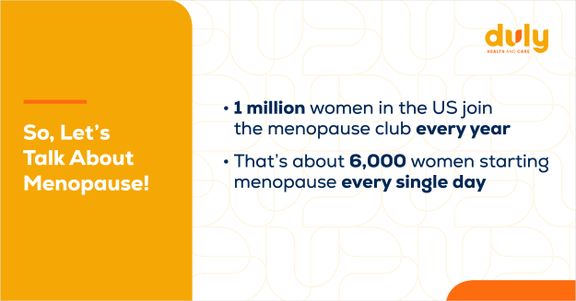Why has menopause been such a hush-hush topic? The stigma, shame, and embarrassment around it — often tangled up with ageism and sexism — have kept the conversation quiet for too long. But that’s changing. Women are speaking up, breaking down barriers, and showing that menopause isn’t something to hide — it’s something to understand and navigate with confidence.
Menopause looks different for every woman. For some, it arrives quietly. For others, it brings a rollercoaster of symptoms. Eventually, your period will stop, and when it does, embracing menopause and finding ways to manage symptoms can ease the journey.
Most women enter menopause in their early 50s, but it’s not a one-size-fits-all timeline. About 5% of women hit this milestone in their early to mid-40s, and for some, menopause may arrive even earlier — before age 40 — which is considered premature menopause.

Also read: 7 Myths About Menopause — And the Truth Behind Them
Breaking the Silence on Menopause
There’s no question that the chatter around menopause is getting louder. More women, healthcare leaders, lawmakers, and celebrities are speaking up. And it’s about time.
Women want open conversations with their doctors and friends. They’re not just talking — they’re seeking relief, especially from those infamous “private summers” (aka hot flashes), brain fog, and anxiety. Menopause is no longer taboo — it’s a shared journey, and women are reclaiming it with strength and honesty.
Are you ready to chat about menopause? The Duly Care team is here to answer any questions you might have. Schedule an appointment with a Duly certified menopause practitioner today.
Menopause Symptoms You Should Get to Know
Menopause can be a pain. But the key is knowing what to expect so you can take control and find the relief you deserve. Here are 3 menopause symptoms that can affect your quality of life. And here’s the kicker: they can show up at any stage — whether you’re in early menopause, perimenopause, or even post-menopause
- Hot, hot, hot flashes! These sudden heat waves can last seconds to minutes, leaving you drenched and irritable. Hormonal changes are the main culprit.
- Sleep struggles. Falling and staying asleep can become a nightly battle during menopause, thanks in part to hot flashes morphing into night sweats. When your body struggles to regulate its temperature, your sleep — and your mood — suffer. It’s a frustrating cycle that can leave you feeling drained and irritable during the day.
- Painful sex. As estrogen levels drop during menopause, the vaginal walls thin and dryness sets in, making sex uncomfortable or even downright painful. Talking to a healthcare provider about treatment options, like lubricants, moisturizers, or hormonal therapies, can help restore comfort and intimacy.
Managing Menopause Symptoms
Even with more candid conversations about menopause, about 73% of women choose not to seek treatment for their symptoms. Why? Some feel they can manage on their own, while others don’t realize that effective relief is available. The good news is that women have options.
Hormone therapy can be an effective option for many women. It can help replace lost estrogen, improve sleep, and reduce bone loss. While hormone therapy may not be appropriate for all women, for the majority of women aged 45 – 55 experiencing symptoms, menopausal hormone therapy may be the best option.
Here are some options your doctor might recommend.
Lifestyle Changes
- Eat healthier: Focus on veggies, lean protein, and whole foods while cutting back on sugar and processed snacks.
- Boost nutrients: Add vitamin D, calcium, zinc, magnesium, iron, and B vitamins to your diet to combat hormonal imbalances.
- Dodge hot flash triggers: Minimize spicy food, alcohol, and caffeine.
- Stay active: A regular exercise routine can improve your mood and boost endorphins.
- Try relaxation techniques: Yoga, meditation, or deep-breathing exercises can help reduce stress.
Medical Treatments
- Hormone therapy: It reintroduces hormones your body has lost and eases symptoms like hot flashes and night sweats, while lowering the risk of conditions like dementia, heart disease, and stroke.
- Antidepressants: They can help reduce hot flashes and night sweats.
- Vaginal estrogen: It relieves vaginal dryness and discomfort.
Also read: Guiding You From Puberty to Menopause
Finding a Certified Menopause Practitioner
All OBGYNs are trained in menopause care, so you can always rest assured that your OBGYN will be in the know. But as you start your menopause journey, you may want to consider working with a Certified Menopause Practitioner (CMP).
CMPs are providers who have additional training in caring for women throughout and after menopause, and they meet standards set by the North American Menopause Society (NAMS). They take classes specifically about menopause and pass a NAMS certification exam, making them uniquely qualified to provide menopause care.
Schedule an appointment with a Duly Health and Care Certified Menopause Practitioner
Let’s Keep the Menopause Conversation Going
Menopause is inevitable — it’s just a matter of when it arrives. Whether it comes early or right on schedule, one thing is clear: women are in the driver’s seat when it comes to how they manage their symptoms. Suffering in silence? That’s officially off the table.
Health Topics:








